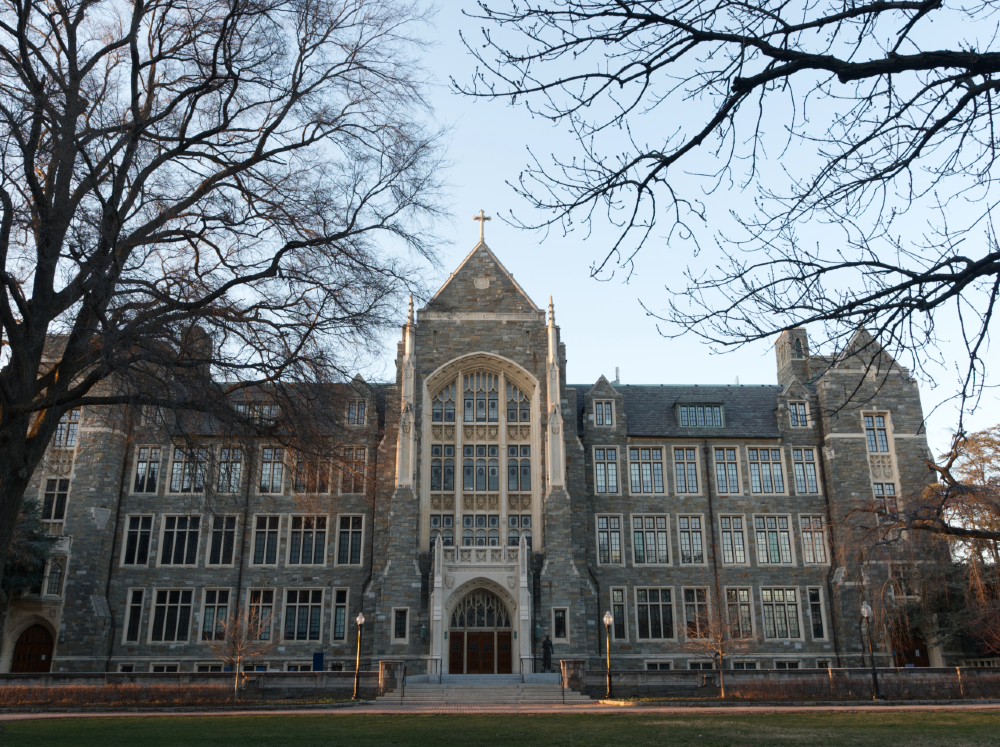For the first time, the university invited graduate student government representatives to directly raise issues regarding racial justice, tuition discounts and financial aid at a meeting with key university employees.
On March 18, Georgetown University Board of Directors members and administrators attended a meeting with graduate student representatives from Georgetown’s Graduate Student Government, Student Bar Association and Medical School Executive Student Council. The student representatives primarily raised concerns with university staff about the 5% tuition discount, as well as concerns about the lack of racial justice initiatives across the graduate schools. This meeting marked the first time that graduate student representatives had a platform to pose questions directly to members of the board of directors, according to Henry Watson (GRD ’24), the current president of GradGov.
The meeting notes provided to The Hoya did not attribute specific names to quotes, but rather only delineated between if a university official or student representative was speaking.

Graduate students requested that this meeting occur in response to concerns raised by graduate student attendees at a Nov. 20 town hall hosted by GradGov. Graduate students expressed concerns about the university’s announcement that undergraduate students would be receiving a 10% tuition discount, while graduate students would only receive a 5% discount. Student representatives suggested during the town hall that there was inadequate communication from the board of directors.
The fact that other graduate programs across the country had not decided to offer any tuition reductions served as one of the board’s reasons for a lower graduate discount than undergraduate discount, according to Olivia Hinerfeld (SFS ’17, LAW ’21), president of the Student Bar Association, the student government at the Georgetown University Law Center.
“It sounded like a lot of the top-level administrators, as board members, were informed by the fact that their own children, who are our age and in graduate school, had not gotten discounts at their various programs,” Hinerfeld said in a phone interview with The Hoya.
The university cited several other schools that did not provide any tuition discount when explaining the rationale behind its decision, according to a member of the administration.
“The default in talking to our peers was zero,” a member of the administration said during the meeting. “We didn’t want to have zero for the graduate students, and that was a bold move because no one else was moving in that direction. We went beyond that. I get it, five is less than ten. You weren’t part of how close that was to zero. And we had to make the case for the five.”
The board acknowledged at the meeting that its initial responses did not sufficiently address graduate students’ concerns raised in relation to the tuition discount difference, according to Watson.
“When we asked whether they recognized that this disparity and the way it was communicated caused a lot of bad feelings, they seemed to appreciate that fact and may have internalized that it was a problem and that it wasn’t handled the best way,” Watson said during GradGov’s March 19 senate meeting.
Multiple factors limited Georgetown’s ability to provide a larger discount, such as the university’s fixed level of operating costs and increases in technology costs while transitioning to the virtual environment, according to a board member’s statement at the meeting.
The university reviewed the needs of graduate and undergraduate students, specifically housing needs, when making decisions about 2020-21 tuition rates, according to a university spokesperson.
“Decisions about tuition and fee levels are complex, because we must balance the needs of a range of community members and the long term welfare of the institution,” the university spokesperson wrote in an email to The Hoya. “The University is committed to providing the best possible Georgetown education, and at the same time, to providing financial support for as many Masters and Ph.D. students as possible.”
The student representatives at the meeting also demanded that the university devote increased attention to racial justice initiatives. Specifically, they called for an increased number of Black professors, an improved bias reporting system, mandated faculty inclusion training and expanding core curriculum diversity requirements, according to statements made by student representatives at the meeting.
The meeting presented an opportunity for graduate representatives to share specific demands directly with the board, according to Jonah Klempner (LAW ’22), current GradGov chief of staff and GradGov president-elect.
“They actually straight out asked us for our wishlist. They said: ‘What are three things you would like to see?’” Klempner said in a phone interview with The Hoya. “We took that as an opportunity to tell them exactly what we would like to see. I think that they shared our outrage at what’s going on. They actually saw this as an opportunity to, even though diversity isn’t really in the board’s jurisdiction, push the same thing as we’re pushing to the president.”
The university remains dedicated to creating an inclusive space where all students can thrive, according to a university spokesperson.
“Our first commitment is to our students — their safety and wellbeing — and to fostering an environment where they can learn and do their best work,” a university spokesperson wrote in an email to The Hoya. “We are deeply appreciative of GradGov for sharing their thoughts and ideas around racial justice, and must continue as a University working to enhance the diversity of our professoriate and student body.”
Students are optimistic to continue this channel of discussion between graduate students and the board, according to Klempner.
“This was the first time we were able to express directly our opinions to the board, and they want to do it again,” Klempner said during the senate meeting. “I think this is the start to a new avenue of communication to the highest level of decision-makers at Georgetown.”





















